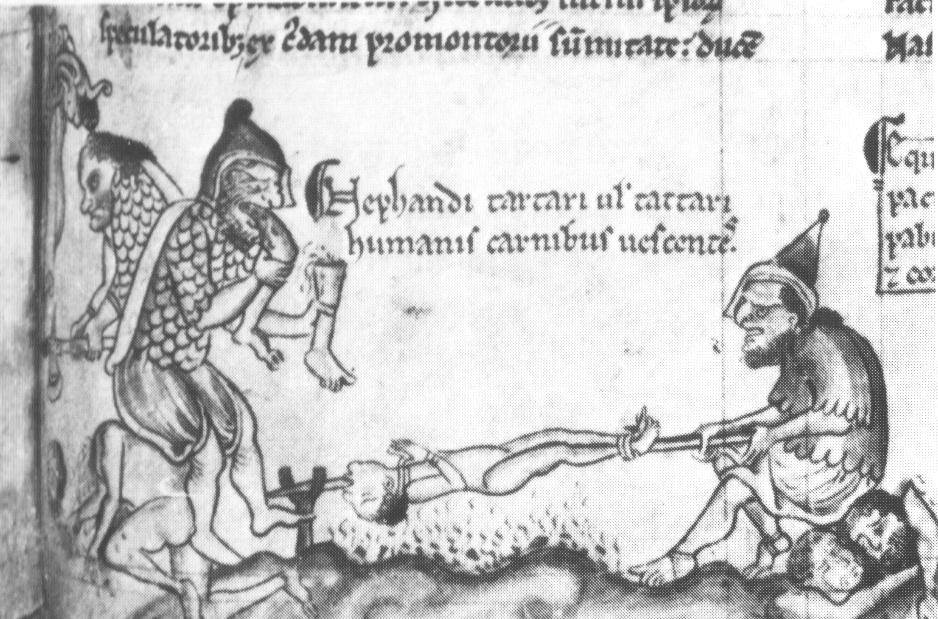List of incidents of cannibalism
List of Incidents of Cannibalism
Cannibalism, the act of consuming another individual of the same species as food, has been a part of human history and various cultures for millennia. This article provides a comprehensive list of notable incidents of cannibalism throughout history, spanning from ancient times to modern-day occurrences. It is important to note that the motivations behind these acts range from survival in extreme conditions to ritualistic practices and psychological disorders.
Prehistoric Times[edit | edit source]
Evidence of cannibalism in prehistoric times has been found through archaeological discoveries. Sites such as Atapuerca in Spain have yielded bones with cut marks, indicating the butchering of human bodies for consumption.
Ancient Civilizations[edit | edit source]
In ancient civilizations, cannibalism was often ritualistic or part of warfare practices.
- The Carthaginians were reported by their enemies to practice child sacrifice and possibly cannibalism, though these accounts are debated by historians.
- In Mesoamerica, the Aztecs practiced human sacrifice and are sometimes alleged to have consumed parts of the victims, though this is a topic of scholarly debate.
Middle Ages[edit | edit source]
During the Middle Ages, instances of cannibalism were often related to famine or siege conditions.
- The Siege of Ma'arra during the First Crusade is one of the most infamous incidents, where crusaders reportedly resorted to cannibalism.
Early Modern Period[edit | edit source]
The early modern period saw cannibalism in the context of exploration, colonialism, and shipwrecks.
- The Donner Party in 1846–47, American pioneers who were stranded in the Sierra Nevada mountains, resorted to cannibalism for survival.
19th Century[edit | edit source]
- The case of the Essex, a whaling ship that sank in 1820, inspired Herman Melville's Moby-Dick. The survivors, adrift in lifeboats, resorted to cannibalism.
20th Century[edit | edit source]
The 20th century contains numerous documented cases of cannibalism, often related to war, isolation, or extreme survival situations.
- During the Soviet famine of 1932–33, there were widespread reports of cannibalism.
- The Andes flight disaster in 1972 involved survivors of a plane crash resorting to cannibalism to survive in the mountains.
21st Century[edit | edit source]
Instances of cannibalism in the 21st century are often related to criminal acts or psychological disorders.
- In 2012, the case of Alexander Kinyua in the United States involved the murder and cannibalism of a roommate.
Cultural and Ritualistic Cannibalism[edit | edit source]
In some cultures, cannibalism has been practiced as a part of ritual or religious ceremonies.
- The Fore people of Papua New Guinea practiced a form of cannibalism as part of funeral rites, which led to the spread of the Kuru disease.
Cannibalism in Mythology and Folklore[edit | edit source]
Cannibalism features in the mythology and folklore of many cultures, often as a cautionary tale against such practices.
- The story of the Wendigo, a creature from Algonquian folklore, is said to be born from the act of cannibalism.
Legal and Ethical Considerations[edit | edit source]
The legal and ethical considerations surrounding cannibalism are complex and vary by jurisdiction. In many places, there are no specific laws against cannibalism but related acts such as murder, desecration of corpses, and assault are illegal.
This article is a psychology-related stub. You can help WikiMD by expanding it!
Transform your life with W8MD's budget GLP1 injections from $125
W8MD offers a medical weight loss program NYC and a clinic to lose weight in Philadelphia. Our W8MD's physician supervised medical weight loss centers in NYC provides expert medical guidance, and offers telemedicine options for convenience.
Why choose W8MD?
- Comprehensive care with FDA-approved weight loss medications including:
- loss injections in NYC both generic and brand names:
- weight loss medications including Phentermine, Qsymia, Diethylpropion etc.
- Accept most insurances for visits or discounted self pay cost.
- Generic weight loss injections starting from just $125.00 for the starting dose
- In person weight loss NYC and telemedicine medical weight loss options in New York city available
- Budget GLP1 weight loss injections in NYC starting from $125.00 biweekly with insurance!
Book Your Appointment
Start your NYC weight loss journey today at our NYC medical weight loss, and Philadelphia medical weight loss Call (718)946-5500 for NY and 215 676 2334 for PA
Search WikiMD
Ad.Tired of being Overweight? Try W8MD's NYC physician weight loss.
Semaglutide (Ozempic / Wegovy and Tirzepatide (Mounjaro / Zepbound) available. Call 718 946 5500.
Advertise on WikiMD
|
WikiMD's Wellness Encyclopedia |
| Let Food Be Thy Medicine Medicine Thy Food - Hippocrates |
Translate this page: - East Asian
中文,
日本,
한국어,
South Asian
हिन्दी,
தமிழ்,
తెలుగు,
Urdu,
ಕನ್ನಡ,
Southeast Asian
Indonesian,
Vietnamese,
Thai,
မြန်မာဘာသာ,
বাংলা
European
español,
Deutsch,
français,
Greek,
português do Brasil,
polski,
română,
русский,
Nederlands,
norsk,
svenska,
suomi,
Italian
Middle Eastern & African
عربى,
Turkish,
Persian,
Hebrew,
Afrikaans,
isiZulu,
Kiswahili,
Other
Bulgarian,
Hungarian,
Czech,
Swedish,
മലയാളം,
मराठी,
ਪੰਜਾਬੀ,
ગુજરાતી,
Portuguese,
Ukrainian
Medical Disclaimer: WikiMD is not a substitute for professional medical advice. The information on WikiMD is provided as an information resource only, may be incorrect, outdated or misleading, and is not to be used or relied on for any diagnostic or treatment purposes. Please consult your health care provider before making any healthcare decisions or for guidance about a specific medical condition. WikiMD expressly disclaims responsibility, and shall have no liability, for any damages, loss, injury, or liability whatsoever suffered as a result of your reliance on the information contained in this site. By visiting this site you agree to the foregoing terms and conditions, which may from time to time be changed or supplemented by WikiMD. If you do not agree to the foregoing terms and conditions, you should not enter or use this site. See full disclaimer.
Credits:Most images are courtesy of Wikimedia commons, and templates, categories Wikipedia, licensed under CC BY SA or similar.
Contributors: Prab R. Tumpati, MD






